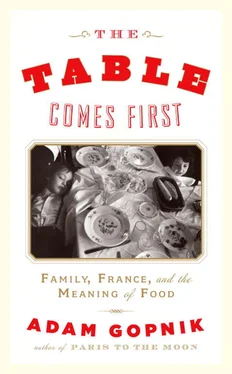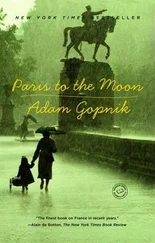Yet there is a tongue-in-cheek, self-mocking tone to his work, and to French food writing of the period generally, which academics often miss. We have often heard these days about the difference between sincerity (saying what you truly think) and authenticity (being who you really are). There is as big a difference, though, between being sincere and being in earnest. Both Brillat-Savarin and Grimod de La Reynière are entirely sincere in their passion for eating, as they are in their small discriminations, their appetite for order and system. They love food. They really do. But they are never completely in earnest, always kidding about their subject even as they celebrate it, and Grimod’s aphorisms are always to be taken as an instance of the mock-heroic. (With the understanding that mock-heroic is different from the ironic: the ironic says, “I don’t really mean this”; the mock-heroic says, “I mean what I say, but I know that saying so has its absurd aspects.”)
Brillat-Savarin and Grimod don’t entirely mean what they write, but then they sort of do. When de La Reynière says that “lunch is the meal of friendship, dinner of etiquette, and tea of children; supper alone belongs to love,” he is both summing up the new pecking order of meals (under which, for instance, there really were two kinds of déjeuners —one a true lunch, the other, petit déjeuner , a “little lunch,” or breakfast, a separate meal of chocolate or coffee and bread) and using the Enlightenment turn of mind, with its love of oversimple summary and a neat schedule of emotions, against itself, to mock its own proprieties. It’s a joke, but not just a joke. Grimod is smiling, but he’s not kidding. Or when he writes that “all the other people of Europe theorize and argue; only the Frenchman knows how to talk,” he is in part paying a patriotic compliment to his own people, but also recognizing, as Brillat-Savarin had before him, that the table was the one place where French superiority could still assert itself. It’s a loser’s boast. Even Brillat-Savarin’s most famous mot, “Tell me what you eat, and I will tell you who you are,” is a jest as much as a judgment, not meant to be taken entirely seriously—a prejudice dressed up as an absolute.
“Playful” is an ugly word in English, since it suggests the opposite of true play: tyrannical teachers, brutish coaches, sadistic bosses, all like to think of themselves as “playful.” So one pauses before saying that the writing of Brillat-Savarin and Grimod is “playful.” But “ludic,” an older and odder word, suits the gastronomes well; they are aware of the absurd aspects of their enterprise even as they undertake it. When Brillat-Savarin writes of his “Dynamometer,” which registers where on the social ladder you belong according to how you choose to eat, or ranks gourmands according to many classes—from the first level, at which you eat truffled turkey, to the fourth, where presumably it’s pot-au-feu right down the line—using “gastronomic tests,” there’s a smile on his prose. He’s kidding around about the French mania for systematization, while taking part in it at the same time. (This tone has its American equivalent later in the nineteenth century; when Melville and Twain write about the confidence man as the most representative and greatest American figure, they really mean it and they don’t. As con men in America, so cooks in France; they really are admired, but admiring them is also a way of making fun of the people, generals and statesmen, whom you are supposed to admire more.)
This double-talk, kidding the new powers by praising the lower arts, is present in most of Grimod de La Reynière’s best lines about food. When he writes, for instance, that “the cook looks death in the eye more often than the soldier,” he means it—to be a cook is to see a lot of carnage and to know how to evaluate it, to know when to hang the carcass and when to slice it up at once—but he is also suggesting that the soldier’s courage is hardly more useful than the cook’s. Or when he writes beautifully that “the pig is the encyclopedic animal”—meaning that it includes everything from lowly feet to all-purpose bacon and tender filet—he is both offering a lovely summary and joking about those other “encyclopedic animals” the high-minded philosophes attend. There’s your encyclopedia, on four trotters. We miss something essential about the birth of food writing if we miss this tone of sober counter-Enlightenment clowning, its tongue-in-cheek parody of the age’s pieties, a new tone sobered by experience and made lighter by life. There is a noisy form of quietism in Grimod, a lip-smacking form of life doubting. Nothing works out the way you think it will; you might as well eat. This note of bitter, brilliant, defeated glamour exudes from his work.
For where Brillat-Savarin’s liberalism is central to his idea of good eating, Grimod’s reactionary politics is key to the passion of his gourmandise . When Grimod writes that a gourmand’s first duty “is to sample everything and have an aversion to nothing,” he is proposing a kind of table-based extension of Voltaire’s great comment, upon being asked to return a second time to a male bordello, “Once a philosopher, twice a pervert.” But we can recognize the chastened wisdom of the postrevolutionary period, too. Loss, defeat—first the moral defeat of hope in the Terror, then the practical defeat of the French by the Germans and English—are the emotional keys to the growth of the food scene in Paris. The thought that we have our greatest triumphs at the table implies that we have been defeated on the field. No successful militaristic nation has ever cared too much about eating. Robespierre and Napoléon, who brought disorder, fear, and eventual defeat to France, were both ascetics. Thinking too hard, trying too hard, can lead to terror and war; thinking alternately with eating is a saner plan. We can organize and systematize all we like about eating—but in the end the animal will return. Whatever we say about food today, we will be hungry again tomorrow.
The Paris food scene, the first “culinary field,” is in this way partly an extension of “the habit of cultural explanation,” an incursion of intellect into an area previously thought to be the simple province of Nature. But the food writers never forget that natural appetite persists in the face of all systems. Brillat-Savarin, the disillusioned liberal, remains a man of the Enlightenment, bringing order to the table; Grimod, the reactionary, is very much a man of the counter-Enlightenment, seeking in abiding pleasures salvation from all those scary absolutes. But both know better than to plan a perfect meal.
Brillat-Savarin and Grimod divide between them the empire of food; they are the two working philosophers of taste who invented its literary form, and almost all food writing since has taken as its mask either Brillat’s warm ironic smile or Grimod’s brilliant epigrammatic grimace. Yet they have much in common, too. The soft snap and crackle of long-braised rueful wisdom in the work of Brillat-Savarin and Grimod is very different from the racket of arriviste learning. The table’s intuitions always trump its new rules. Food writing was born in the wake of the revolution and the Terror, and one hears in its corridors and back hallways the sigh of those who stayed alive, returned from exile and panic, and are now grateful for the smallest of pleasures. It’s an animal truth—the pig’s truth at Christmas, the turkey’s the day after Thanksgiving—and more welcome for that: the wisdom of those who survive is that survival is itself a kind of wisdom.
This tone, and this kind of food writing, seems uniformly easy to like. Still, we should also see that while Brillat-Savarin’s writing on food is reformist and optimistic, Grimod’s, for all its genius, is a counsel of defeatism and despair, and was seen that way at the time: the Almanach des Gourmands soon had a rejoinder published by an angry liberal: The Almanach of Starvation . In Grimod’s celebration of eating, there are the first intimations of the cordoning off of the French palate—the emergence of the idéologie française , the myth of a douce France, safeguarded from outside influence and living on its own bounty and beauty, that would do so much harm to the Republic. Not by accident does Grimod’s brilliant grimacing take the very same tone as that of Robert Courtine, the famous twentieth-century food critic who took over Grimod’s pen name, La Reynière, and wrote for decades in Le Monde with the same wincing high style. Only after his death did the eminent newspaper discover, or reveal, that Courtine had been a virulent anti-Semite and an extreme right-wing Vichyiste. The turn to the table can be made as often in bitterness as in benevolence.
Читать дальше












